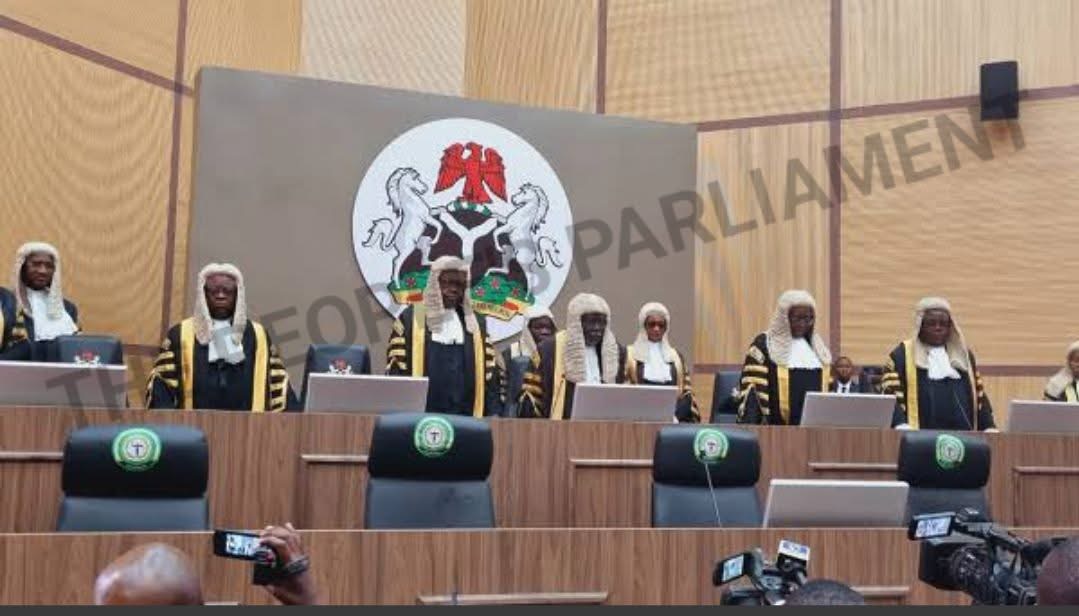Columns
THE CASE OF MMESOMA EJIKE HAS UNFORTUNATELY ENDED WITHOUT CLOSURE: ANOTHER OPPORTUNITY FOR JUSTICE WAS LOST
Published
2 years agoon
By
Ekwutos Blog
By Emeka Ugwuonye
Mmesoma Ejike, the teenager who took the general admission test conducted by the Joint Admissions Matriculation Board (JAMB) manipulated her scores and was naïve enough to flaunt it. That got the attention of people who believed her extraordinary but manipulated scores. Regardless of her original intentions, whatever they were, the flaunted scores got the attention of important people both in government and in the private sector. Awards and flowed from those who believed they were dealing with a student of exceptional academic records with potentials for greatness.
Though not much was known about this girl prior to her earning the explosive media attention, every indication shows she is from a poor background. The demeanor and appearance of her father, who vigorously defended her before finally apologizing for it, gave an idea of the family environment where she was raised. Apparently, none of her parents ever took JAMB tests. Mmesoma is thus probably the first person in her family to encounter JAMB.
When you throw a stone in the air, it will eventually come down, and it is impossible to tell in advance the spot it will land. That was what happened to Mmesoma. When she went on social media to flaunt her manipulated super scores, she thought it would end there. But no; there are consequences to everything, sometimesunpleasant, sometimes unexpected, and sometimes they lead yo prison.
But the story of Mmesoma and JAMB is not a story of one girl and one testing board. It is a story about a country, its institutions, its people and how they interface. The story tested our country because it happened at a time when a man became a Governor with fake certificates. Thus, the story of Mmesoma showed what happens when a story involves the wrongdoing of a poor person and where a powerful institution seems to lose face.
Many powerful people were embarrassed by this story. The State Government, which eventually discovered the manipulation was not able to do so until its officials had made public pronouncements that showed that for two weeks the believed the manipulated result to be genuine. It must be embarrassing for a government to be deceived by a teenager for two weeks. Also, a wealthy philanthropist awarded scholarship to the teenager based on his belief also that the manipulated result was genuine. JAMB officials, given past record of inability to demonstrate the integrity of their testing processes, was embarrassed that scores it did not give were being accepted by the general public. In the end, all these powerful people and institutions had mud on their faces and anger in their hearts. And they were bound to over-react. They were on one side against the teenager. It was precisely under that setting that Nigerian justice was put to test and it failed.
Unfortunately, justice and due process were pushed aside and emotions and might prevailed. To someone shallow in thinking, everything now seems okay – the girl has confessed, the father has apologized, JAMB has been “vindicated”, etc. But how did all this happen? The process of finding the truth is often more important than finding the truth. I will give two simple illustrations: (1) If we torture a person suspected of stealing and due to the torture, he eventually confesses and actually brings out the stolen good, we can say that we finally found the truth, and that will be right. That is; torture produced the truth. (2) A person is wrongly suspected of stealing and he is put to torture. After a long period under torture, he continues to deny the allegation. The torturer says: “He must be innocent because despite the torture, he continues to deny”. And the innocent man is set free. Again, torture will appear to have led to the truth, which is the discovery that the suspect didn’t do it. Can we then agree that since torture has led to the discovery of the truth in the two cases, we would recommend torture as the process to discovery of truth?
Whether Mmesoma was wrong or not, whether she did it alone or with collaborators, whatever her real intentions, the way JAMB and Anambra State Government went about this matter would have produced the same result – a confession and apology from the poor accused to the powerful accuser. This is exactly what due process was intended to prevent – lingering doubts in the mind of the ordinary people. The hasty panel, the media lynching, the threats and the punishment of three-year ban without a fair hearing and continued threats of criminal prosecution would have been enough to produce similar ending as we have seen. But such ending will leave so many questions unanswered. That is why this case ended without closure. Any process that lacks transparency will leave doubts in the minds of many. How did JAMB arrive at the length of the ban it imposed on the girl? Why not two years or four years? Was JAMB guided by any standard measurement of how long yo ban a candidate in such circumstance? Or was the length of punishment determined by the amount of anger in the heart of JAMB leadership?
Administering justice with transparency and following due process is crucial for a fair and effective system. Here are some key reasons why we needed transparency in the handling of Mmesoma story:
1. Safeguarding Individual Rights: Transparency and due process ensure that individuals’ rights are protected and respected. It guarantees that everyone is treated fairly and impartially under the law, regardless of their social status, wealth, or power. It is not just the rights of Mmesoma that we are concerned about. We were concerned about the rights of everyone who has annoyed JAMB or any other Government agency in Nigeria. Those rights must be safeguarded at all cost.
2. Enhancing Public Trust: When the administration of justice is transparent and follows due process, it fosters public trust and confidence in the legal system. People need to believe that their grievances will be heard and resolved fairly, without any hidden agendas or biases. What happened in Mmesoma’s case only reinforces the belief that you are in trouble only when you offend powerful people. Or, that while the rich can forge certificates and become Governors, it is a different ballgame when the same is done by the poor.
3. Preventing Abuse of Power: Transparency acts as a check on the abuse of power by authorities. When the process is open and visible, it becomes difficult for individuals in positions of authority to manipulate or misuse their power for personal gain or to target specific individuals or groups. The process used in this case could so easily be abused in cases where the accused may be innocent.
4. Ensuring Accountability: Transparent administration of justice facilitates accountability. When the process is visible to the public, officials involved are more likely to act in an accountable manner, knowing that their actions are subject to scrutiny. It is clear from this that there was no standard by which JAMB could have been restrained in what its officials could do. If they could summarily ban her, they could do more. They could order her arrest and detention without trial. Not knowing the limits of what JAMB could do was a problem.
5. Promoting Consistency and Quality: Following due process ensures that legal decisions are based on established rules and procedures. It promotes consistency in the application of the law and helps prevent arbitrary or discriminatory outcomes. Transparency also encourages judges and officials to maintain high standards of professionalism and competence. The Commissioner of Education in Anambra State was reported to have directed the DSS to arrest the teenager at their first meeting after JAMB denied the scores.
6. Facilitating Error Correction: Transparency and due process allow for errors to be identified and corrected. If mistakes occur during the legal process, they can be identified through transparency, and appropriate remedies, such as appeals or reconsideration, can be pursued. JAMB still don’t know how to prevent a reoccurrence of what happened in Myeloma’s case
7. Upholding the Rule of Law: The rule of law is a fundamental principle of a democratic society. Transparent administration of justice and adherence to due process are essential components of the rule of law. They ensure that decisions are based on established laws rather than personal whims or preferences. Clearly, much of the outcome we ended with in this case were driven by the whims and caprices of JAMB officials on collusion with Anambra State government officials embarrassed for being so easily misled by a teenager’s prank.
Overall, transparency and due process are essential for maintaining a just and equitable system, protecting individual rights, fostering public trust, and upholding the principles of fairness, accountability, and the rule of law. The lack of transparency in the Mmesoma case unfortunately harmed society rather than otherwise.
DPA.
You may like


Gov. Okpebholo Sets Up Government Task Force in Edo State appoints SP Michael Anetor as Commander


Davido Revolutionizes Transportation with Electric Bike Venture


Akwa Ibom Deputy Governor Mourns Loss of Daughter


Funke Akindele Offers Heartfelt Support to Destiny Etiko Following On-Set Accident


Sowore To Be Charged With Cybercrime For Calling President Tinubu’s Handpicked Police IGP, Kayode Egbetokun ‘Illegal IGP’


MTN Nigeria Under Fire as Verydarkman Laments Poor Network Services
Columns
LAND OWNERSHIP IN NIGERIA: SETTING THE RECORD STRAIGHT- Hon Success Opara
Published
4 days agoon
January 24, 2025By
Ekwutos Blog
As the issue of land ownership continues to generate debate among Nigerians, it is essential to clarify the legal framework governing land ownership in the country. Contrary to popular belief, individuals do not have outright ownership of land in Nigeria.
The Land Use Act: A Framework for Land Ownership
The Land Use Act of 1978 is the primary legislation governing land ownership in Nigeria. Section 1 of the Act vests all land in each state in the governor of that state, who holds it in trust for the people. This means that the government has ultimate control over all land within its territory.
Certificate of Occupancy: A Lease Agreement
When an individual purchases land or is allocated a plot, they are issued a Certificate of Occupancy (C of O). However, this document does not confer outright ownership on the holder. Instead, it represents a lease agreement between the government and the individual, granting the latter the right to occupy and use the land for a specified period, usually 99 years.
Implications of the Land Use Act
The Land Use Act has significant implications for land ownership in Nigeria. Key takeaways include:
– All land belongs to the government, which holds it in trust for the people.
– Individuals do not have outright ownership of land; instead, they hold a lease agreement with the government.
– The Certificate of Occupancy is a lease document, not a title deed.
– The government retains the power to revoke or withdraw a C of O if the terms of the lease are breached.
In conclusion, it is essential for Nigerians to understand the legal framework governing land ownership in the country. By recognizing that all land belongs to the government and that individuals hold lease agreements, we can avoid misconceptions and ensure that land transactions are conducted in accordance with the law.
Columns
“Why men should marry poor women” – Mr Nigeria (VIDEO)
Published
2 weeks agoon
January 18, 2025By
Ekwutos Blog
Nigeria’s top influencer, Ugochukwu Nwokolo, popularly known as Mr. Nigeria, recently shared his perspective on why men should consider marrying women from less privileged backgrounds.
Speaking on a recent episode of The Honest Bunch podcast, Ugochukwu expressed his belief that poor women possess certain qualities that make them ideal partners, citing their prayerfulness and fertility as key attributes.
In his words, “Poor girls turn me on. The poorer she is, the more attractive I find her. A poor woman will wake up at 7:00 a.m., join NSPPD, and pray fervently for her husband. She’ll say, ‘I’m putting my husband on the fire altar.’ When it comes to fertility, poor women can be incredibly fertile.”
Ugochukwu Nwokolo is the first-ever Mr. Nigeria Supranational, crowned by the Silverbird Group under the Mister World Nigeria platform. He will represent Nigeria in the Mr. Supranational competition held in Poland.
FOLLOW THE LINK BELOW TO SEE VIDEO:
https://x.com/OneJoblessBoy/status/1880540913497518518?t=WFcx7Q6extTGZjdFyNkSww&s=19
Columns
Do you know that an Att0rney General in Nigeria can walk into any c0urt while a Cri’minal case is going on and put a st0p to that cri’minal case
Published
2 weeks agoon
January 18, 2025By
Ekwutos Blog
Do you know that an Att0rney General in Nigeria can walk into any c0urt while a Cri’minal case is going on and put a st0p to that cri’minal case
I mean any crim’inal case at all, if you like make e b the case wey dey kpai person or make e be R(@)P£ case or anyone at all
And they have the p0wer to do so without any explanation at all
They can just walk into any c0urt room and say this crim’inal matter will not proceed anymore
I am exercising my p0wer of nolle prosequi as an Att0rney General in Nigeria
Chai, this p0wer sweet
P0wer to st0p any case you want
Ignorance of the law is no excuse

Gov. Okpebholo Sets Up Government Task Force in Edo State appoints SP Michael Anetor as Commander

Davido Revolutionizes Transportation with Electric Bike Venture

Akwa Ibom Deputy Governor Mourns Loss of Daughter
Trending
- Politics11 months ago
Nigerian Senate passes Bill seeking the establishment of the South East Development Commission.

 Business12 months ago
Business12 months agoInflation hits record high of 29.90% on naira weakness

 Politics8 months ago
Politics8 months agoBREAKING: Federal Gov’t Offers To Pay Above N60,000, Reaches Agreement With Labour

 Trending3 months ago
Trending3 months agoNYA demands release of ‘abducted’ Imo chairman, preaches good governance

 SportsNews11 months ago
SportsNews11 months agoOlympic Qualifiers 2024: CAF Confirms Dates For Super Falcons Vs Banyana Banyana
- Business3 months ago
US court acquits Air Peace boss, slams Mayfield $4000 fine

 Politics3 months ago
Politics3 months agoMexico’s new president causes concern just weeks before the US elections
- Entertainment3 months ago
Bobrisky transferred from Immigration to FCID, spends night behind bars

